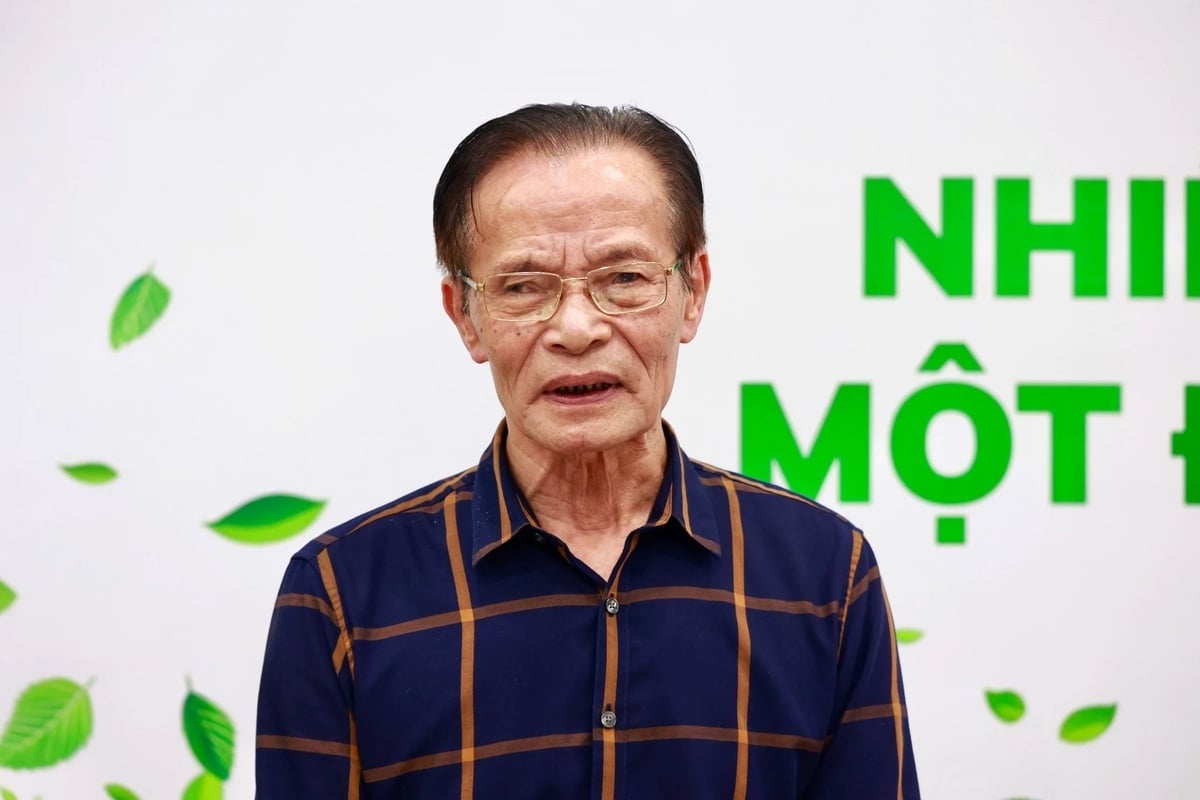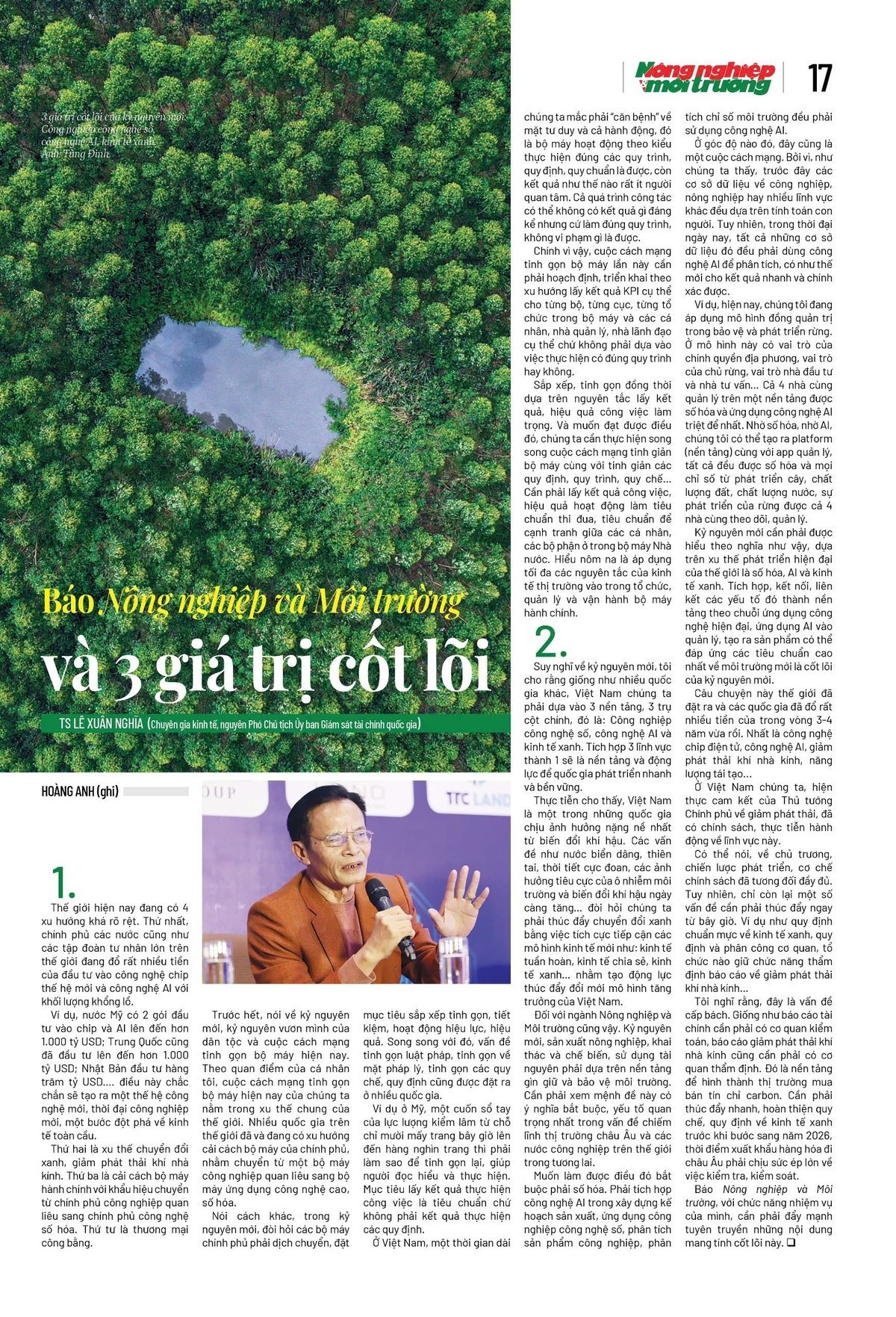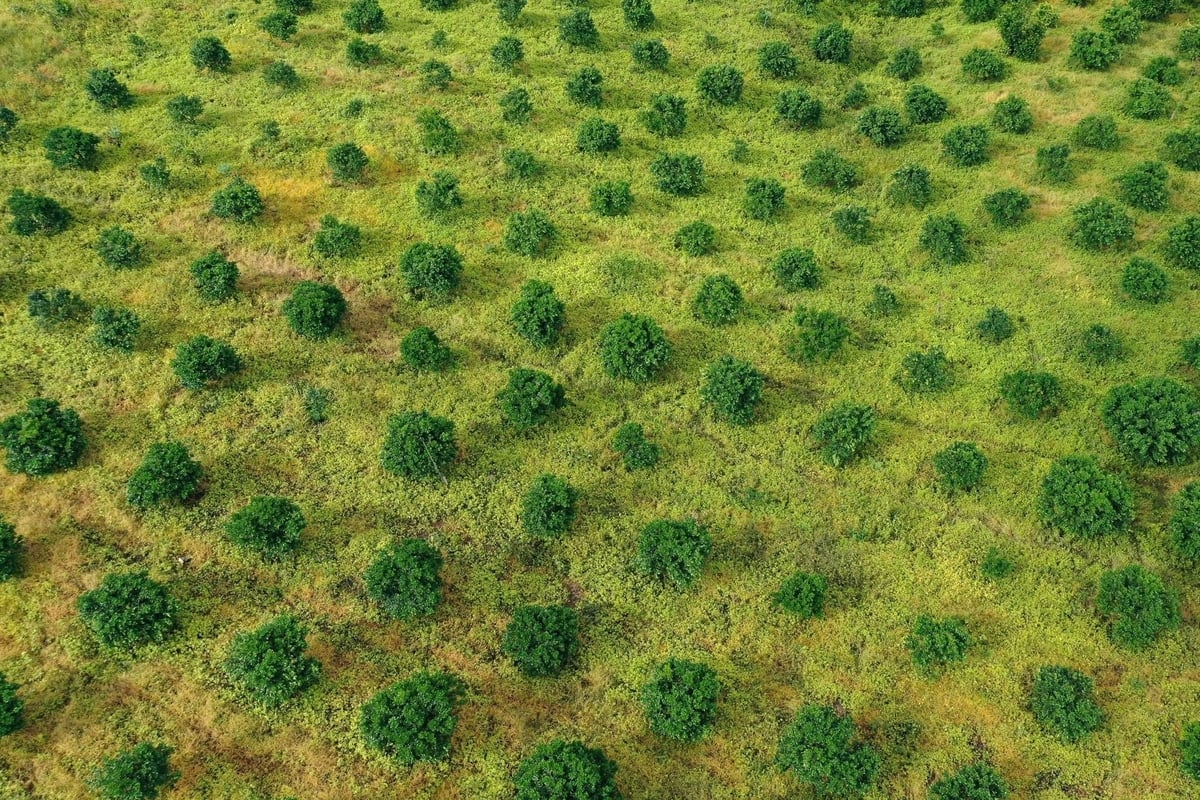December 4, 2025 | 13:03 GMT +7
December 4, 2025 | 13:03 GMT +7
Hotline: 0913.378.918
December 4, 2025 | 13:03 GMT +7
Hotline: 0913.378.918
The world is currently experiencing four distinct trends. First, governments and large private corporations worldwide are investing vast amounts of money in next-generation chip technology and AI, with substantial investment volumes.
For example, the U.S. has two investment packages for chips and AI totaling over USD 1 trillion; China has also invested over USD 1 trillion; Japan is investing hundreds of billions of USD… This will undoubtedly lead to the creation of a new generation of technology, a new industrial era, and a breakthrough in the global economy.

Dr. Le Xuan Nghia: "Vietnam must rely on 3 main pillars: digital technology industry, AI technology, and green economy." Photo: Nguyen Thinh.
The second pillar is the trend of green transition and reducing greenhouse gas emissions. The third is the reform of the administrative apparatus with the slogan "shifting from an industrial bureaucratic government to a digital government." The fourth is fair trade.
First, let's talk about the new era, the era of national awakening and the ongoing revolution of streamlining the administrative apparatus. From my perspective, the current streamlining of the administrative apparatus is part of the global trend. Many countries around the world have been and are reforming their government structures to move from a bureaucratic, industrial machine to a high-tech, digitalized government.
In other words, in the new era, it is required that the government apparatus shift, to be streamlined, cost-effective, and more efficient. Alongside this, the issue of streamlining laws, legal frameworks, and regulations is also being addressed in many countries.
For example, in the U.S., a forest ranger's handbook that was once only a few dozen pages long has now grown to thousands of pages. The challenge now is how to streamline it, so that it is understandable and executable. The goal is to measure the success of the work by the actual results, not by how closely the regulations are followed.
In Vietnam, for a long time, we have suffered from a "disease" in both mindset and actions, where the machinery operated based on strictly following procedures, regulations, and standards, with little regard for the actual outcomes. Entire work processes may yield no significant results, yet as long as the procedures are followed and no rules are violated, it is considered acceptable.
Therefore, this revolution in streamlining the apparatus needs to be planned and implemented with a focus on concrete KPIs for each ministry, department, organization, individual, manager, and leader, rather than just adhering to processes.
Streamlining must be based on the principle of prioritizing outcomes and efficiency of work. To achieve this, we need to simultaneously simplify the apparatus and regulations, procedures, and rules. The outcome and effectiveness of work should be the standard for competition and benchmarking within the government apparatus. Essentially, we must apply market economy principles to organizing, managing, and operating the administrative machinery.
Wherever competition and performance benchmarks can be applied, they should be implemented immediately. At the same time, the foundation must be based on simple processes, clear KPIs, clear tasks, and precise results. Only then can we effectively delegate authority and responsibilities to subordinates, creating space for innovation and encouraging the intellectual contributions of both individuals and teams.

A new principle in administrative reform that many advanced countries are adopting is that the government should not only regard citizens and businesses as stakeholders or service recipients, but also elevate them to a higher level: customers of the government. Clearly, this marks a revolution in mindset. Citizens and businesses are taxpayers; they pay for the government's operations and the services it provides.
Therefore, they should be treated as customers. Conversely, citizens and businesses should evaluate the government as a service provider, judging its performance as good or bad based on the quality of those services.
Reflecting on the new era, I believe that, like many other countries, Vietnam must rely on three foundational pillars: digital technology industry, AI technology, and the green economy. Integrating these three areas into a single, unified platform will provide the foundation and driving force for rapid and sustainable national development.
In practice, Vietnam is among the countries most heavily affected by climate change. Rising sea levels, natural disasters, extreme weather, and the increasing negative impacts of environmental pollution and climate change all underscore the need to accelerate the green transformation by actively adopting new economic models, such as the circular economy, sharing economy, and green economy. These approaches are essential to revitalize Vietnam's growth model.
This also applies to the agriculture and environmental sectors. In the new era, agricultural production, resource extraction and processing, and the use of natural assets must be grounded in environmental protection. This principle must be regarded as a compulsory condition and the most critical factor in gaining access to European and other industrialized markets in the future.
To achieve this, digitalization is a must. AI technology must be integrated into production planning, digital industry applications, and the analysis of industrial products and environmental indicators.
In many ways, this too represents a revolution. Previously, data in sectors like agriculture and industry relied on manual calculations. But in today’s world, these databases must be processed using AI technology to yield faster and more accurate results.
For example, we are currently implementing a co-governance model in forest protection and development. This model involves the local government, forest owners, investors, and consultants. All four stakeholders collaborate on a fully digitized and AI-powered shared platform. Thanks to digitalization and AI, we’ve created a platform and management app that digitizes all processes, allowing all four parties to jointly monitor and manage indicators such as plant growth, soil and water quality, and forest development.

Three core values of the new era: digital technology industry, AI technology, and the green economy. Photo: Tung Dinh.
The new era should be understood in this way, rooted in the global development trends of digitalization, AI, and the green economy. The essence of the new era lies in integrating, connecting, and linking these elements into a foundational system built upon a chain of modern technological applications that apply AI to management and create products that meet the highest environmental standards.
This vision has already been established by the world, and many countries have invested significant resources in it over the past 3-4 years, particularly in electronic chip technology, AI, greenhouse gas emission reductions, and renewable energy.
In Vietnam, the Prime Minister’s commitment to emission reductions is already being translated into policies and practical actions in this field.
It can be said that in terms of development orientation, strategy, and policy mechanisms, we already have a relatively complete framework. However, there remain several urgent issues that need to be addressed immediately. For example, defining standards for the green economy, and clearly assigning which agency or organization is responsible for evaluating greenhouse gas emission reduction reports.
I believe this is an urgent matter. Just as financial reports require auditing agencies, greenhouse gas emission reduction reports also need an authorized body for assessment. This is the foundation for forming a carbon credit trading market. We must expedite the process of finalizing the regulations and frameworks for the green economy before entering 2026 - a time when exports to Europe will face strong scrutiny in terms of environmental inspection and control.
Vietnam Agriculture and Nature Newspaper, with its role and responsibilities, needs to intensify communication efforts on these core topics.
Translated by Kieu Chi

(VAN) As of 2025, the ASEAN region has a total of 69 ASEAN Heritage Parks recognized across its 10 member states. Among them, Viet Nam contributes 15 ASEAN Heritage Parks.

(VAN) Yok Don National Park has high biodiversity with numerous endemic plant and animal species, and it is also the only dipterocarp forest ecosystem conservation area in Viet Nam.

(VAN) Viet Nam and Brunei signed two important MOUs on fisheries and IUU, expanding cooperation in agriculture, the environment, and Halal exports, aiming to substantively implement joint projects.

(VAN) The Viet Nam Coconut Association worked with the International Finance Corporation (IFC) and businesses to promote the supply chain, enhance competitiveness, and develop the coconut industry sustainably.
![Hue aims for Net Zero: [2] Pioneering low-emission tourism](https://t.ex-cdn.com/nongnghiepmoitruong.vn/608w/files/huytd/2025/12/04/0633-dulichzero-4-095634_236-161125.jpg)
(VAN) The ancient capital of Hue has developed Net Zero tourism products and models, aiming to reduce carbon emissions and pioneer the establishment of Viet Nam's green tourism destination.

(VAN) C.P. Viet Nam has announced the successful completion of its goal to plant 1.5 million trees during the 2021-2025 period, a key milestone within company's long-term ESG strategy and its roadmap for emission reduction.

(VAN) This is an initiative of MAE aimed at creating a unified coordination mechanism to implement agricultural cooperation programs with developing countries.